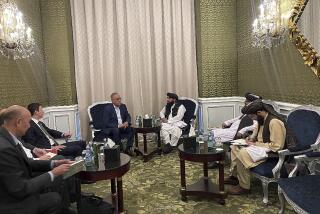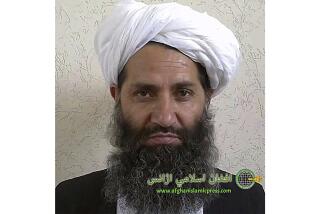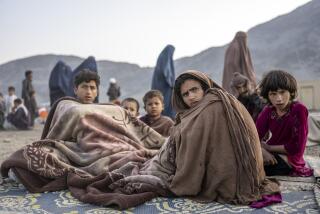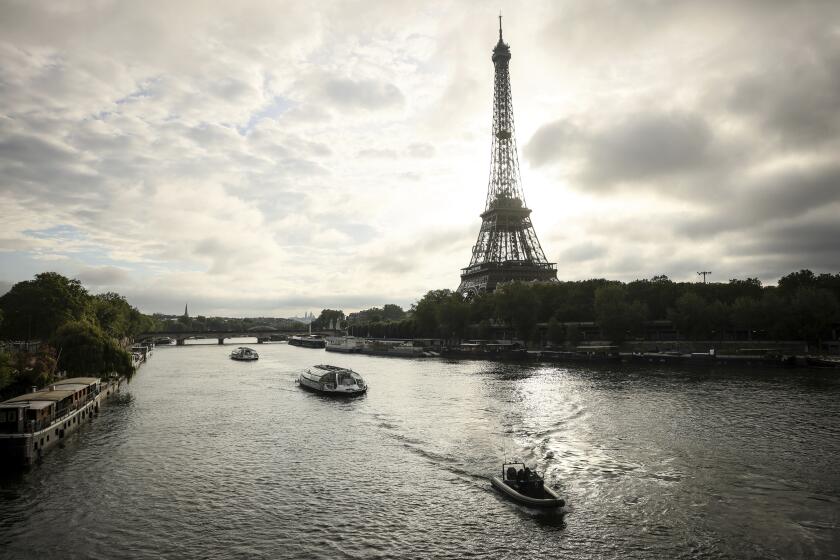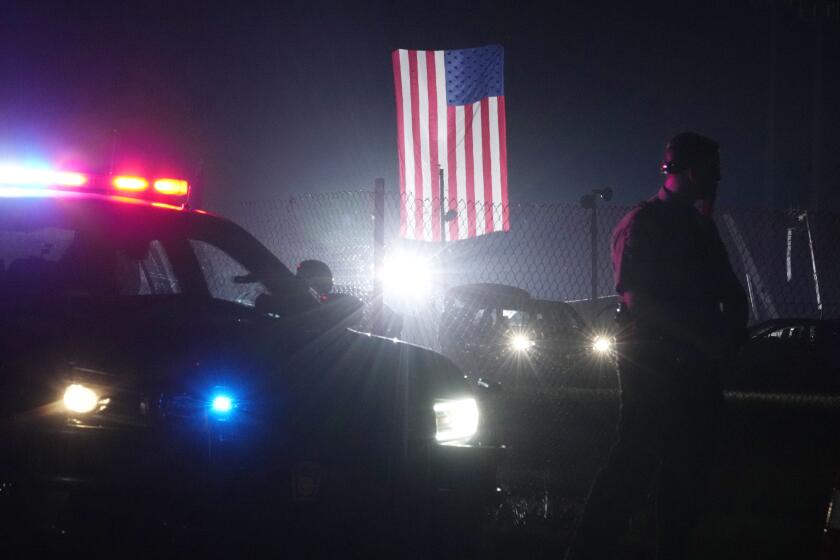Afghan leader Hamid Karzai seeks Pakistan help in Taliban talks
Afghan President Hamid Karzai on Thursday sought to secure help from Pakistani leaders in facilitating peace talks with Pakistan-based Afghan Taliban leaders, while the militant group denied any interest in negotiating with an “impotent” administration.
Karzai’s visit to Islamabad, the Pakistani capital, came amid reports that he had said in an interview that the U.S. and Afghan governments had begun secret talks with the Afghan Taliban. In recent months, U.S. officials have been meeting with Taliban envoys to discuss the establishment of a Taliban office in the Persian Gulf state of Qatar.
But late Thursday, the Taliban issued a statement strongly denying the movement had taken part in secret talks with the Karzai government.
“We have not decided to negotiate with the Karzai regime,” spokesman Zabiullah Mujahid said. He accused the Afghan leader of wanting “to extend his foreign-backed power for a few more days.”
“This false campaign will fail,” he said.
Previously, the Taliban leadership dismissed Karzai as a “puppet” and publicly indicated willingness to talk only with the Americans and the West.
However, Haji Musa Hotak, a member of the Karzai-appointed body set up in 2010 to try to negotiate with the Taliban, said the Taliban position had changed.
“The Taliban have stopped insisting on talking to the U.S. and not the Afghan government,” he said. “Now the Taliban are saying they are ready to talk with the Afghan government face to face. They said they will talk to both Americans and the Afghan government.”
Karzai held separate meetings with Pakistani Prime Minister Yousuf Raza Gilani and President Asif Ali Zardari. He also met with Zardari and Iranian President Mahmoud Ahmadinejad, who also arrived in Islamabad on Thursday.
Ahmadinejad’s meetings with Pakistani leaders were expected to center on plans for a pipeline that would send Iranian natural gas to Pakistan. Though Washington opposes the idea because of concern over Iran’s nuclear program, Pakistan has signaled its intent to move ahead with the pipeline.
With Kabul and Washington pushing for peace talks, Pakistan is regarded by both capitals as a major obstacle in the process. Afghan and American officials maintain that Pakistan’s intelligence community continues to actively support Afghan Taliban insurgents.
Washington has long alleged that top Afghan Taliban leaders remain based in the outskirts of the southern Pakistani city of Quetta, and that the biggest threat to U.S. troops in Afghanistan, the Afghan Taliban wing known as the Haqqani network, continues to operate from havens in Pakistan’s volatile tribal areas along the border with Afghanistan.
Pakistan’s links with the Haqqani group date to the Soviet occupation of Afghanistan in the 1980s, when Pakistan’s primary spy agency, Inter-Services Intelligence, backed the group’s founder, Jalaluddin Haqqani, and other resistance fighters.
Experts say Pakistan views the militant group as a key asset in a post-U.S. Afghanistan to prevent nuclear archrival India from extending its influence to Kabul. Pakistan’s military leaders continue to regard India, and not Islamic extremists, as their main nemesis. Pakistan denies that it supports Haqqani militants or provides them sanctuary.
Afghan officials also suspect a link between Pakistani intelligence agents and the Sept. 20 assassination of former Afghan President Burhanuddin Rabbani, who was selected by Karzai to lead negotiation efforts with the Taliban. Rabbani was killed at his home when a man who said he was a Taliban emissary detonated a bomb hidden in his turban as the two men met.
Pakistani leaders have adamantly denied the allegation. On Thursday, Zardari said Pakistan recently sent a team to Kabul to assist Afghan officials in the investigation of Rabbani’s slaying. A statement issued by Zardari’s office said the president told Karzai that Rabbani “was a friend of Pakistan and an honest and serious interlocutor,” and called the assassination “the work of those elements who do not want a peace and reconciliation process in Afghanistan.”
While in Pakistan, Karzai was also scheduled to meet with several leaders of the country’s influential religious parties, including Maulana Samiul Haq, regarded as the spiritual father of the Taliban. Haq operates an Islamic seminary in northwestern Pakistan, where several Taliban leaders once studied. Haq is thought to maintain close ties with the Taliban.
Rodriguez reported from Islamabad and King from Kabul.More to Read
Start your day right
Sign up for Essential California for news, features and recommendations from the L.A. Times and beyond in your inbox six days a week.
You may occasionally receive promotional content from the Los Angeles Times.
